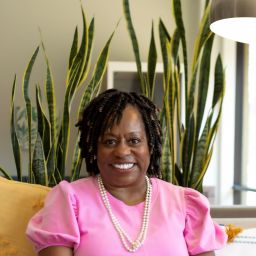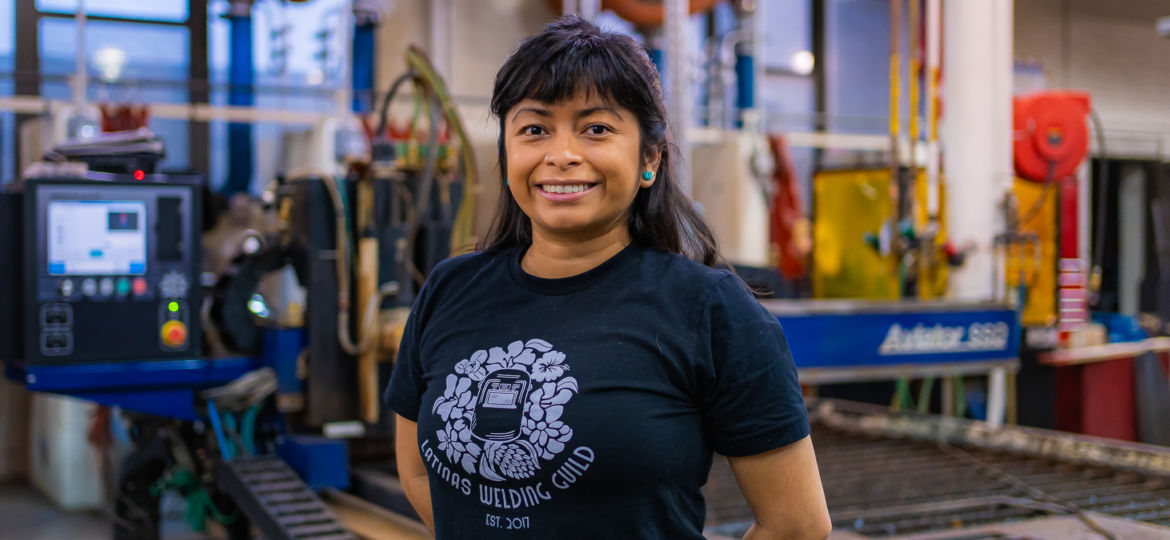
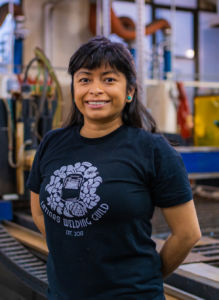
Some people see struggles around them and think, “That’s too bad.” Others, like Consuelo Poland, shake up an industry while extending a flame-resistant gloved hand to other Latinas like her. Poland is offering community and education—as well as a solution for talent-starved skilled trades—through her 501(c)3 organization, Latinas Welding Guild.
Welding isn’t typically on the top of most high school seniors’ career wishlists. It’s a craft even further out of mind for those whose educational systems have eliminated trade-heavy programs in favor of tech-focused career skills. While tech has earned its place in educational programming, the deemphasis on skilled trades has put the American economy and Indiana’s talent pipeline in a tough spot. Plus, access to training programs in some communities is nonexistent. All of this leads to a missed opportunity for well-paying careers and economic growth through thriving Indiana businesses.
Guatemalan-born Hoosier, functional welder, and artist Consuelo Poland noticed all of this as she witnessed the struggles of her peers in the Latino community. Having spent her career as a welder and leader, serving as the managing director for the RUCKUS Makerspace, she combined her talents and vision for the future with the formation of the Latinas Welding Guild.
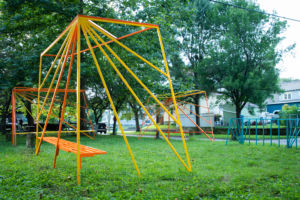
The Guild is more than an advocacy organization; it’s an educational platform, hands-on learning environment, and support structure with buy-in from community leaders and businesses throughout the state. What may have started from an “ah-ha” moment has grown to become a movement, ever-flexing in response to community member needs and industry opportunities. But when it came time to execute her vision, the road to reality wasn’t always easy. Getting it done while managing her career and art, took true grit.
The notion of disrupting an industry and changing lives through education may be easy to dream up, but actually doing it is a serious undertaking. When asked how she drummed up the courage and resources to build a non-profit from scratch and establish a physical space, it’s clear that she’s the right woman at the helm. Conseulo explains: “Honestly, it’s determination and not being afraid to ask for help or ask questions. The worst-case scenario is hearing ‘no,’ but it also motivates me to think of alternative ways to make it work. I’ve tried to be intentional about who I’m asking for help, input, and advice from. I also think because I’m a ‘doer’ it’s helped me learn a lot very quickly—what works and what doesn’t—and that’s made it a little more clear for me to understand what our needs may be.”
Being a “doer” has helped accelerate the Guild’s efforts, which currently operates a year-round schedule for its students. This barrier-free pathway to education is a cornerstone of the Guild’s purpose. The Guild also provides a safe space for students to learn the art and skill of welding, offers access to scholarships, and facilitates language support as a total package for eager future welders.
This valiant effort isn’t without its challenges. According to the Guild, 96% of certified welders are male and the income discrepancy between male and female welders is near 28%. Along with equipping empowered students with desirable skills and solid salary data, the Guild is pursuing improvements for the welding craft beyond what will solely benefit its members.
“We’re currently working on our Equitable Employment Program which would include three Indiana Commissions along with industry-related professionals to help us engage, educate, and enlighten both the welder and the employer. We feel by educating both the welder and the employer we can create some cultural awareness and open the lines of communication,” says Consuelo.
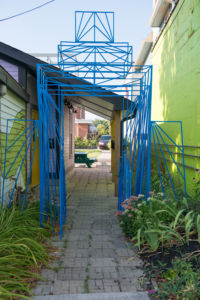
While the Guild’s primary focus is on career readiness, its purpose of community building is also at the forefront. Welding is more commonly thought of as a career skill, but it can be applied through personal and professional pursuits of art and other projects. Consuelo leverages her talents to motivate and inspire other artists, entrepreneurs, and others to create their own work.
“As a whole, our organization has endless opportunities for our women to utilize welding for teaching, entrepreneurship, and workforce development. So, I hope with more support from our working board, board committees, graduates, staff, and contracted staff we can continue to expand our impact and offer more opportunities to diverse welders,” Consuelo says.
Up next, the Guild is working toward establishing relationships with local schools, with Indianapolis Public Schools high on its wish list. The Guild hopes to train and place its eligible graduates into welding instructor roles, later integrating into other leadership positions, further advocating for welding and other skilled trades’ rightful inclusion in educational programming.
“It’s not just students we want to engage with; it’s families, administrators, and most importantly, school counselors. The common hurdle we’ve seen and heard from young and adult women is that their families, friends, and counselors didn’t encourage them to try welding, stick with it, or attempt it—because it would be too hard, uncomfortable, or male-dominated. In an ideal world, the workforce becomes so saturated with women all over the world that we have to rethink our mission,” Consuelo says.
A future full of women welders may be just the solution for upward mobility that Indiana needs.
Natalie Derrickson is a communications professional, strategist, and writer who’s forever a supporter of skilled trades’ rightful place in education. You can connect with her on Instagram, Twitter, LinkedIn, and her website.
All of our content—including this article—is completely free. However, we’d love it if you would please consider supporting our journalism with an Indy Maven membership.




